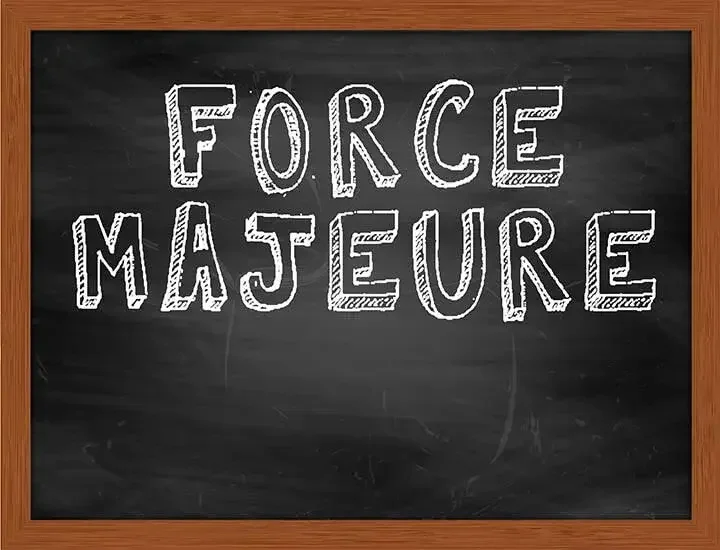All business contracts should include a clause called a "force majeure" clause, which allows the contract to be suspended or excused if certain events happen. It's a way to plan for the unforeseen and worst-case scenarios.

What qualifies as a force majeure event?
Mark Tyson, of Tyson Law PLLC, Seattle, Washington, explains, "Force majeure events often include natural disasters like flood, fire, earthquake, and, in some instances, epidemics or pandemics."
Force majeure events also often include large scale or catastrophic human conflicts like war, terrorist acts, riot or other civil unrest. Other events, like government orders, trade embargoes, strikes, and other labor stoppages, may also be included in a given force majeure clause.
Including a clause such as this in your contract is an important protection. The contract should specify the types of events that are covered by the clause but, in general, the events should:
- Be outside the reasonable control of the party fulfilling the contract
- Affect the party's ability to fulfill the contract completely or within the time frame chosen
What is considered foreseeable in a force majeure event?
Another consideration that will impact the validity of a force major event is if the event was foreseeable.
Braden Perry, of Kennyhertz Perry, LLC in Kansas City, Mo., explains. "If the event was foreseeable and not covered in the contract, then it cannot excuse performance. However, if it was not foreseeable, then it may be covered by the contract even if it is not specifically listed."
Perry goes on to point out that the situations like the COVID-19 pandemic would likely be considered unforeseeable and says, "Interestingly, a force majeure clause that does not specifically cover a 'pandemic' may actually be evidence that it was not foreseeable." He predicts there will likely be litigation in the coming years to whether the pandemic is covered by these clauses or not.
Lewis Rhodes of General Counsel, P.C. in McLean, Va., suggests that the key point involved with COVID-19 may hinge on the government.
"Most clauses have provisions for government actions which would include bans or quarantines," Rhodes says. "I had a client that was planning a large conference in Oregon. The contract did not have language covering a disease outbreak, but it did have language relating to government regulations. So, when Governor Brown banned large gatherings, the contract force majeure clause was triggered."
Act of god versus force majeure
Contracts sometimes make reference to acts of God as events that can suspend the contract. Acts of God are natural events like hurricanes, floods, blizzards, tsunamis, tornadoes, and so on, which a business can't avoid despite planning and prevention. You may wonder what the difference is between an act of God and a force majeure.
Tyson explains it this way, "The terms "force majeure" and "act of God" are sometimes used interchangeably in casual discussion. However, in most force majeure clauses, the term "acts of God" is actually included within the definition of a force majeure event as a broad category of unpredictable, natural events."
How to invoke a force majeure clause
If you are faced with an event that makes it impossible for you to fulfill the contract within the time-frame indicated, the burden is on your company to notify the other party to the contract. Remedies should be specified in the contract and can include:
- Total relief of liability
- Cancellation or pausing of performance
- The ability to renegotiate
- Termination of the contract
If you find yourself unable to fulfill the contract, Rhodes says, "As soon as an event occurs, you need to tell the other side you cannot perform and explain why. In the hotel example above, the day after the Governor made her announcement, we wrote a letter to the hotel, telling them that we could not hold the conference and were terminating the contract. The hotel understood and accepted the withdrawal."
Perry recommends that if you find yourself in this situation that you "document everything, reach out to your contractual partners to negotiate first, but also take steps to prepare for a legal fight. Because we are in relatively novel times, it's unclear how judicial interpretation of force majeure contractual provisions will play out. It's important to be proactive and do everything possible to mitigate before abandoning your contractual obligations."
A force majeure clause protects your company if you are unable to fulfill the contract due to events outside your control. Be sure all of your contracts include this kind of clause.

